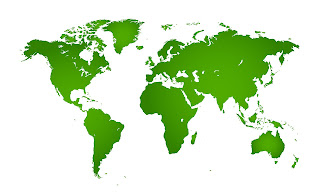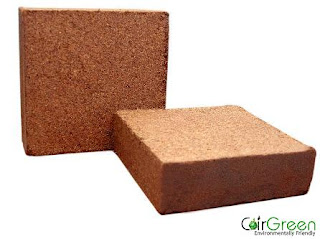In
line with its vision to be an ambassador for the environment, CoirGreen
recently launched four upgraded environmentally friendly products that focus on
soil conservation. The products are alternatives to hard revetments such as
concrete and stone walls. Using soil conservation products made out of coir is
very advantageous. Coir fibre comes from an entirely renewable source and is a
by-product from an established industry where it was formerly regarded as a waste
product. Furthermore, coir uses water economically and is also an ideal soil
improver. Therefore, using products made out of coir is environmentally
beneficial.
The
upgraded soil conservation products are
· Erosion control
blankets
· Geotextiles
· Coir Logs and
· Coir Pallets
Geotextiles
or Coir netting (Coir matting) CGgeo ™ reduces soil erosion and is used
globally for bioengineering and slope stabilization applications. Geotextiles
have no synthetic materials. They are strong, durable, waterproof and salt
water resistant. Geotextiles are used for stream/river bank protection,
shoreline stabilization, slope stabilization in railway cutting and
embankments, sediment control and so on.
The
easy to install, 100% natural CoirGreen logs are made out of cylinder or
square shaped netting packed with coir fiber. The logs are eco-friendly and
biodegradable. CG logs are used for stream bank stabilization, shoreline
protection, wetland mitigation etc. The
logs can easily be anchored with wooden stakes.
Over a period of time the logs completely disintegrate leaving only
humus.
Coir
pallets, also known as coir pillows, are widely used for establishing
vegetation around lakes, canals and rivers. The pallets are a suitable
alternative to hard revetments. Coir has a high content of lignin and this
means that the fibre can cope with high-energy water flows and has a long
degradation period of 3-5 years. CoirGreen produces coir pallets which are 100% natural and biodegradable. The
pallets are made from a combination of mattress fibre and coir netting cases.
The Earth’s soil provides ecosystem services which
are critical for life. The soil acts as a water filter and a growing
medium. It provides habitat for billions
of organisms; contributes to biodiversity and supplies most of the antibiotics
used to fight diseases. Humans use soil as a holding facility for solid waste,
filter for wastewater, and foundation for our cities and towns. Soil is the
basis of our agro ecosystems which provide us with feed, fiber, food and fuel.
“A nation that
destroys its soil destroys itself” - Franklin Roosevelt
More information on CoirGreen's Biodegradable products, please visit www.coirgreen.com.




















